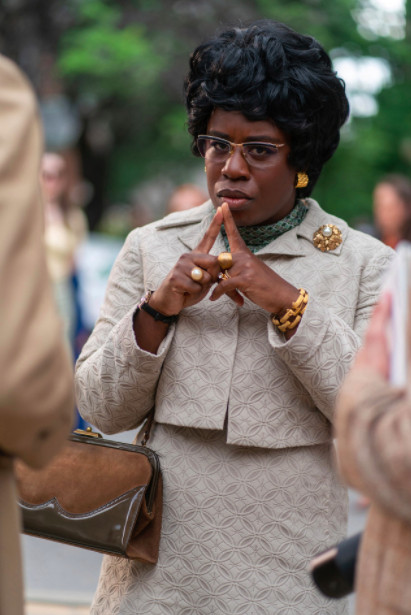In American politics, the Equal Rights Amendment is among one of the quieter embarrassments in United States history, a proposed legislation that, incredibly, has never been passed. Asserting that equality under the law not be denied on the basis of sex, the ERA has spent nearly 100 years in limbo. First introduced by activists in 1921, nearly passing in the 1970s, and finding renewed interest this year, the struggle over the amendment slowly became a long-simmering culture war that remains unfortunately relevant.
Mrs. America, the new FX series streaming exclusively on Hulu, is the story of why it fell apart and the woman who made it happen. A nine-episode limited series, the show largely follows Phyllis Schlafly, the notorious conservative activist who discovered her calling in founding the STOP ERA movement and whose rhetoric helped successfully brand feminism with the cartoonishly angry stereotype that persists to this day.
In the series, Schlafly, who died in 2016 (after publishing a book in support of Donald Trump), is a master of spin. Early in the show, Mrs. America illustrates how STOP ERA began to gain traction when the group started to sway politicians with bread and pies. Baked goods weren’t the only trick in STOP ERA’s arsenal, however. With Schlafly at the lead, the group argued that the ERA would rescind what they said were freedoms and protections for women under the current law: the freedom to be a housewife and raise children unconcerned with the stress of breadwinning, or the assurance that women wouldn’t or shouldn’t be drafted for the armed services.
Portrayed by Cate Blanchett in a performance that’s a guaranteed Emmy nomination, Schlafly is the center of the story, but hers isn’t the only one Mrs. America is telling. The series also delves into the women’s movement opposite Schlafly, the leaders of which would form the National Women’s Political Caucus as a wave of popular support made the ERA seem like it was within reach of becoming the law of the land.

The constellation of characters consists of names most with a passing familiarity with feminist history might recognize: Betty Friedan (Tracey Ullman), Flo Kennedy (Niecy Nash), Bella Abzug (character actress Margo Martindale), Shirley Chisholm (Uzo Aduba), and Gloria Steinem (Rose Byrne). While each episode of Mrs. America is ostensibly centered on a different character, those characters are always in orbit around Schlafly. This feels like a necessary evil. Mrs. America spans most of the 1970s, and Schlafly is singularly driven throughout the decade, while her opponents come from all walks of life with varied priorities. It also feels like a missed opportunity.
This comes to light most clearly in the series’s third episode, “Shirley,” which follows Chisholm, the first black woman elected to Congress and the first black candidate to mount a presidential campaign. Specifically, it details the days leading up to the 1972 Democratic National Convention, where Chisholm’s campaign ended and she was pressured to release her delegates to the preferred candidate, George McGovern, without any concessions in exchange.
In “Shirley,” Mrs. America deftly fills in the spaces between the broad strokes of history, illustrating the internal disagreements in the movement as well as external forces opposing it. “Shirley,” and episodes beyond it, depict moments where experienced political movers tell activists what is or isn’t possible, where the concerns of the marginalized are often the first discarded, despite their efforts to bring the wider movement to where it is.
Unfortunately, Mrs. America lacks the room to delve as deeply into this, as the breadth of the moment is often subject to the gravitational pull of Schlafly’s story. Again, some of this is necessary and even addressed by the show. The ERA organizers, in discussing their infighting, note that Schlafly and her STOP ERA team have one message and want one thing, while the women’s movement is concerned with a large platform of positions that are often argued over. But the show is also more interested in Schlafly, with every episode a new chapter in her slow development from ambitious political hopeful to one of the disingenuous and shrewd voices that helped build the framework for our never-ending culture wars.
It’s a work that tries to understand a complicated, interesting woman but never quite finds an answer it believes. Mrs. America looks at the life of Schlafly and mostly finds tragic irony: that a woman could do so much to overthrow a cause while being exemplary of that cause and that she could do more work on the ground to advance the birth of the modern conservative movement and be wholly shut out from holding any real power in it. In the show — as in life— Schlafly is accused of being the very kind of feminist she warred against, and it’s the argument Mrs. America seems to agree with most.
This informs its more troubling concerns — Schlafly’s arc in Mrs. America is one of ambition, not identity. What Schlafly actually believes isn’t as important as what she thinks she deserves, and it’s because of this that the less palatable aspects of her biography — including alleged support by the Ku Klux Klan or the racism of her supporters — while not unmentioned, are only depicted in passing. Pivotal scenes where Schlafly begins to cross ethical lines begin to center themselves on Alice Macray (Sarah Paulson), a fictional character who eventually finds herself at odds with Schlafly — just as, it’s implied, any other reasonable woman would.

Perhaps that’s what’s most frustrating about Mrs. America. In revisiting the efforts of the women’s liberation movement of the ‘70s, there are good parallels to the politics of today. It illustrates the way a lack of intersectionality can undermine movements that benefit everyone, the ease with which the disingenuous conservative machine can mobilize in the face of progress, and how the efforts of people of color are easily forgotten in the interest of so-called pragmatism or the glamour of the white artists whose work is celebrated by the upper class.
But Mrs. America can’t quite come to grips with a reality that, by 2020, should be clear: to some Americans, the public affirmation of other identities, lifestyles, or creeds is perceived as hostile to their very existence. To some Americans, there are benefits that come with perceiving yourself as Christian or white or moral, and those benefits depend on the supremacy of that identity over others. More broadly, there are plenty of Americans who don’t consider themselves to be racist or bigoted but are happy to support the political campaigns of those who are or want to live in a world more accommodating of bigotry. From Jim Crow to STOP ERA to modern gerrymandering and voter suppression, regression is as big a part of our history as progress. Mrs. America, ironically, isn’t American enough.
https://www.theverge.com/2020/4/17/21225023/mrs-america-review-hulu-phyllis-schlafly-fx-stop-era-equal-rights

